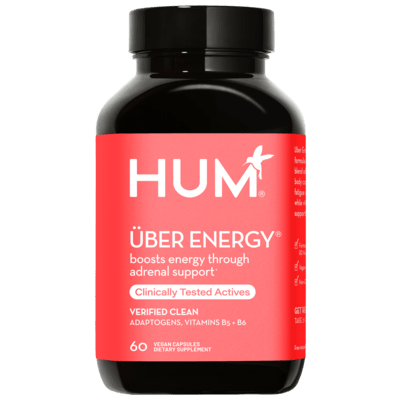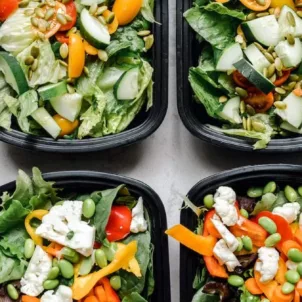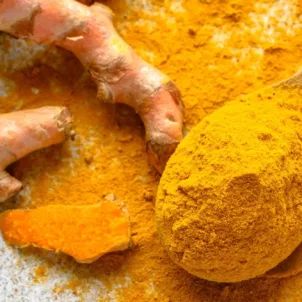THE WELLNEST • Food • Healthy Eating
Sneaky Ways Sugar Is Sabotaging Your Health
By Allie Flinn •
October 27, 2016
We investigate the effects of sugar on your health and body.
When a sugar craving hits, it’s hard to focus on anything other than obtaining and consuming ice cream, cake, and Oreos. The aftermath isn’t pretty: Stomach pains, bloating, and mental fogginess are just a few symptoms of overindulging in sugar. (Curse you, chocolate!)

 This non-caloric natural sweetener is made from the leaves of stevia rebaudiana, a plant found in Central and South America. A study published in the Journal of Dietary Supplements found that consuming stevia actually improved insulin function in diabetic rats after 30 days. Another study found that a component in stevia called stevioside can help reduce blood pressure, though researchers have yet to pinpoint why.
When choosing a stevia-based sweetener, look for one that’s non-GMO. (Read more about our stance on GMOs here.)
This non-caloric natural sweetener is made from the leaves of stevia rebaudiana, a plant found in Central and South America. A study published in the Journal of Dietary Supplements found that consuming stevia actually improved insulin function in diabetic rats after 30 days. Another study found that a component in stevia called stevioside can help reduce blood pressure, though researchers have yet to pinpoint why.
When choosing a stevia-based sweetener, look for one that’s non-GMO. (Read more about our stance on GMOs here.)
 Honey has slightly more calories per teaspoon than table sugar (21 compared to 15). However, it contains amino acids, electrolytes, and antioxidants you won’t find in sugar. Honey also has strong microbial properties. One study even found that the pollen in honey can help with allergies! But you want to make sure you opt for raw honey, as refined honey removes many of the nutrients found in the raw version. (Scary note: An investigation found that a huge amount of honey imported into the U.S. from China was mostly sugar water mixed with a tiny bit of actual honey.)
Honey has slightly more calories per teaspoon than table sugar (21 compared to 15). However, it contains amino acids, electrolytes, and antioxidants you won’t find in sugar. Honey also has strong microbial properties. One study even found that the pollen in honey can help with allergies! But you want to make sure you opt for raw honey, as refined honey removes many of the nutrients found in the raw version. (Scary note: An investigation found that a huge amount of honey imported into the U.S. from China was mostly sugar water mixed with a tiny bit of actual honey.)
 Pure maple syrup contains 24 antioxidants, which can help prevent inflammation-causing free-radical damage. (Choose grade-B syrups to get the most benefits.) It’s also lower on the glycemic index than sugar, which means that it raises your blood sugar levels less quickly. It’s also less likely to cause digestive issues (think: bloating and gas).
Pure maple syrup contains 24 antioxidants, which can help prevent inflammation-causing free-radical damage. (Choose grade-B syrups to get the most benefits.) It’s also lower on the glycemic index than sugar, which means that it raises your blood sugar levels less quickly. It’s also less likely to cause digestive issues (think: bloating and gas).
The Effects of Sugar
We’re continuously exposed to the stuff. Back in the late ‘70s, the first dietary recommendations appeared. They promoted low-fat diets, which led to an increase in low-fat and fat-free foods. The problem? These foods didn’t taste great. The solution? They added sugar. So sugar began to infiltrate our diets, and it didn’t stop at low-fat foods. Now, it’s in the wheat bread you buy at Whole Foods and the “healthy” almond butter that costs a fortune. Sugar is also packed into seemingly innocuous condiments. (Need a statistic to wrap your head around? 74 percent of packaged foods sold at supermarkets contain added sugar.)What’s the Deal with Sugar Cravings?
This exposure leads to sugar cravings. Sugar can trigger a reward response in your brain that’s incredibly strong. Shockingly, studies have found that the sweet stuff is more addictive than cocaine. Eating too much sugar can lead to weight gain, high blood pressure, liver damage, and metabolic dysfunction. In addition to causing cravings, eating sugar causes your insulin levels to spike. (Insulin is a hormone that helps regulate your metabolism, and helps your body convert food into energy.) Your body becomes resistant to insulin if your levels are consistently high, which can then lead to type-2 diabetes. From here, it’s important to understand the difference between glucose and fructose. These are the two molecules that compose sugar (sucrose). We need glucose for energy. But here’s the thing: our bodies can produce glucose (thanks, liver!), while fructose doesn’t naturally occur in our bodies. Plus, fructose can only be broken down by our livers; excess fructose is stored as fat. (It’s important to note that while fruit contains fructose, whole fruit also is full of other healthy, good-for-you nutrients like fiber, which slows down your body’s absorption of fructose.)Sugar vs. Fat
Fat spent a long time at the top of the “naughty” food list. However, we now know that fat doesn’t always make you fat. (Read more about healthy fats here.) Recent studies have focused on the detrimental effects of sugar, showing that sugar is actually worse for you than fat. Okay, so sugar’s bad for you. Now what? It’s not realistic to imagine a life void of any sweeteners whatsoever. Luckily, there are some healthy sugar substitutes out there. Just remember: Sugar is sugar. You want to watch your consumption of it, even if you choose a natural sweetener. The World Health Organization recommends keeping your daily sugar intake to five percent of your daily calories. Otherwise, you could end up experiencing the harmful side effects of sugar. Lastly, always read labels to check for added sugar.The Worst Sugar Substitutes
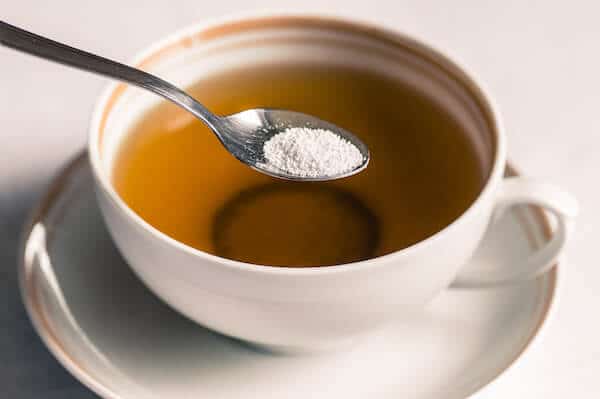
Non-Caloric Artificial Sweeteners (NAS)
These go by names of aspartame, saccharin, and sucralose. For starters, researchers found that non-caloric artificial sweeteners alter the bacteria in the gut in such a way that it increases the risk of obesity. Plus, your brain doesn’t respond to artificial sweeteners. At the Yale University School of Medicine, researchers found that when you consume sugar, your brain expects energy. But when you consume NAS, that burst of energy doesn’t happen, which results in more cravings. In some cases, you end up consuming excess calories.The Best Sugar Substitutes
Stevia
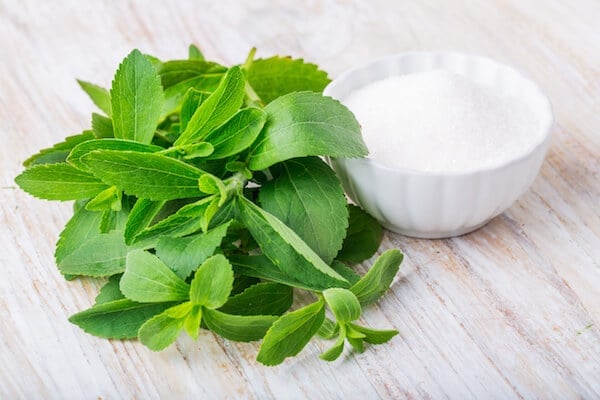 This non-caloric natural sweetener is made from the leaves of stevia rebaudiana, a plant found in Central and South America. A study published in the Journal of Dietary Supplements found that consuming stevia actually improved insulin function in diabetic rats after 30 days. Another study found that a component in stevia called stevioside can help reduce blood pressure, though researchers have yet to pinpoint why.
When choosing a stevia-based sweetener, look for one that’s non-GMO. (Read more about our stance on GMOs here.)
This non-caloric natural sweetener is made from the leaves of stevia rebaudiana, a plant found in Central and South America. A study published in the Journal of Dietary Supplements found that consuming stevia actually improved insulin function in diabetic rats after 30 days. Another study found that a component in stevia called stevioside can help reduce blood pressure, though researchers have yet to pinpoint why.
When choosing a stevia-based sweetener, look for one that’s non-GMO. (Read more about our stance on GMOs here.)
Raw Honey
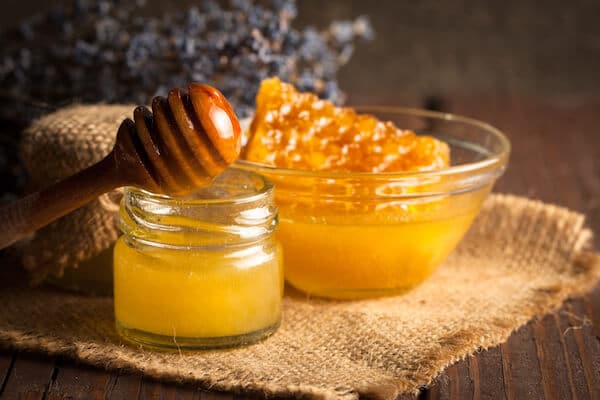 Honey has slightly more calories per teaspoon than table sugar (21 compared to 15). However, it contains amino acids, electrolytes, and antioxidants you won’t find in sugar. Honey also has strong microbial properties. One study even found that the pollen in honey can help with allergies! But you want to make sure you opt for raw honey, as refined honey removes many of the nutrients found in the raw version. (Scary note: An investigation found that a huge amount of honey imported into the U.S. from China was mostly sugar water mixed with a tiny bit of actual honey.)
Honey has slightly more calories per teaspoon than table sugar (21 compared to 15). However, it contains amino acids, electrolytes, and antioxidants you won’t find in sugar. Honey also has strong microbial properties. One study even found that the pollen in honey can help with allergies! But you want to make sure you opt for raw honey, as refined honey removes many of the nutrients found in the raw version. (Scary note: An investigation found that a huge amount of honey imported into the U.S. from China was mostly sugar water mixed with a tiny bit of actual honey.)
Maple Syrup
 Pure maple syrup contains 24 antioxidants, which can help prevent inflammation-causing free-radical damage. (Choose grade-B syrups to get the most benefits.) It’s also lower on the glycemic index than sugar, which means that it raises your blood sugar levels less quickly. It’s also less likely to cause digestive issues (think: bloating and gas).
Pure maple syrup contains 24 antioxidants, which can help prevent inflammation-causing free-radical damage. (Choose grade-B syrups to get the most benefits.) It’s also lower on the glycemic index than sugar, which means that it raises your blood sugar levels less quickly. It’s also less likely to cause digestive issues (think: bloating and gas).
More like this
